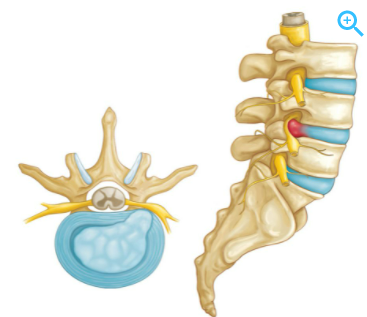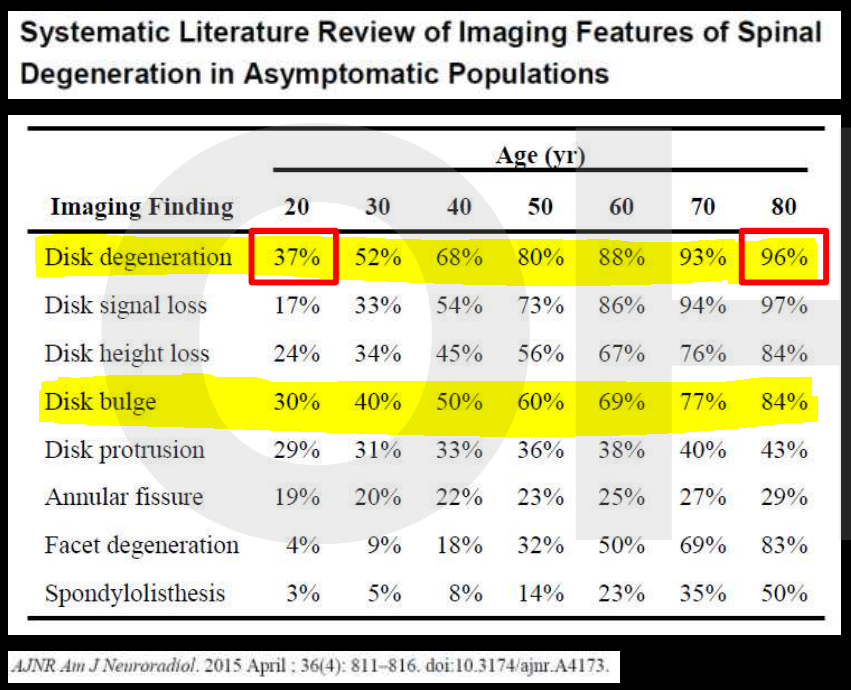|
What is a disc bulge? Did you know that almost 80% of the global population experience an episode of low back pain at some point in their life, with degenerative disc disease and lumbar disc herniation (disc bulge) being the most common. A disc bulge is also known as a bulging disc, slipped disc, or disc protrusion and is a condition during which a nucleus pulposus is displaced from intervertebral space. This can happen in the lumbar (low back), thoracic (mid back) or cervical (neck) spine. Here, the side and cross sectional views of a herniated disk are shown. In a herniated disc the soft, jelly-like centre of the disc can push all the way through the outer ring (source). This can cause pain, and may or may not press on the adjoining nerve, which can cause pain to travel down our thigh or leg, and even down to the inside or outside of our feet. Should I be concerned, will my disc bulge get better? Most occurrences of a bulging disc (disc herniation) resolve with conservative treatment and resolve within as little as two to eight weeks. 85 to 90% of cases will resolve within this time-frame and without substantial medical intervention. It can be scary when you have back pain, or have been informed you have a bulging disc, but there is really good evidence to show that it will get better, without the need for surgery. Disc Bulges - a normal part of ageing process?? Recent evidence has found that disc bulges and degenerative back conditions are a normal part of ageing, just like grey hair and wrinkles on your skin. We should not fear them as being a life sentence, rather just a normal part of life. Furthermore, they don't always result in pain. The study below shows that when 20 year olds WITHOUT back pain were scanned, 37% of them had disc degeneration, and 30% of them had a disc bulge. However, with increasing age, this number continues to increase, and in our 60's 88% of people WITHOUT BACK PAIN were shown to have disc degeneration, and 69% WITHOUT BACK PAIN shown to have a disc bulge. What should I do? Listen to your body and stay as active as you can within your own pain limits. You may find paracetamol helpful in settling your pain in the initial stages. You may find that sitting is better than standing, or vice versa, or standing and arching your back a little, or maybe even laying down and swaying your bent knees gently from side to side. Whatever movement you find that is comfortable for you, and your pain remains below a 2 out 10, continue to do. As your back starts to feel better you may be able to go for some walks, or extend your walks. Backs love movement, and the latest research now tells us that rest is not the best remedy. Deep breathing has also shown to be beneficial in relaxing the musculature of the back, helping to decrease pain. What are the long term solutions for disc bulge and back pain? Following on from the initial recovery phase, an essential part of helping back pain is strengthening and this is what Exercise Physiologists are the experts at! If we can help to strengthen your back, it is less likely that physical load will irritate it, this means that you have a decreased chance of recurrence and less severity of symptoms of future episodes. We now know that pain is multifactorial, this means there are multiple aspects that affect our pain, including psychological and social stressors, nutrition, sleep and physical aspects. We can help to assess your pain and help you to understand your pain, and the things you can do it decrease pain, and improve your strength to help you to live an active life. Discs respond to load and like getting stronger, just like muscles. It has been found that in people who run or lift weights, that their discs are stronger, fatter and healthier!! What a great reason to exercise!! We'd love to help you with your back pain!! Please get in touch or book online to book with an Exercise Physiologist who has a modern and evidenced-based approach to disc bulge and back pain.
0 Comments
Your comment will be posted after it is approved.
Leave a Reply. |
AuthorSLisa Parkinson Archives
July 2024
Categories
All
|



 RSS Feed
RSS Feed